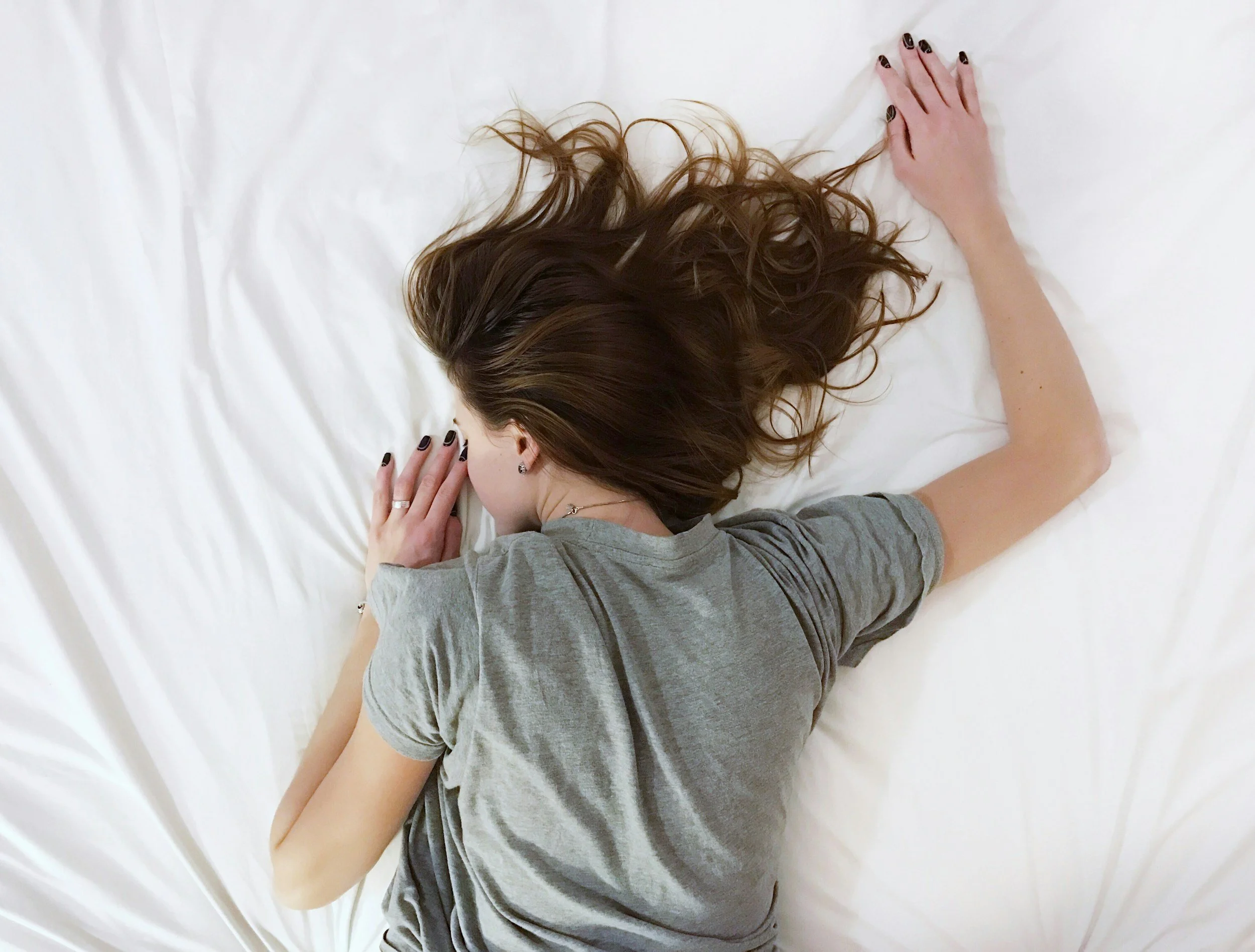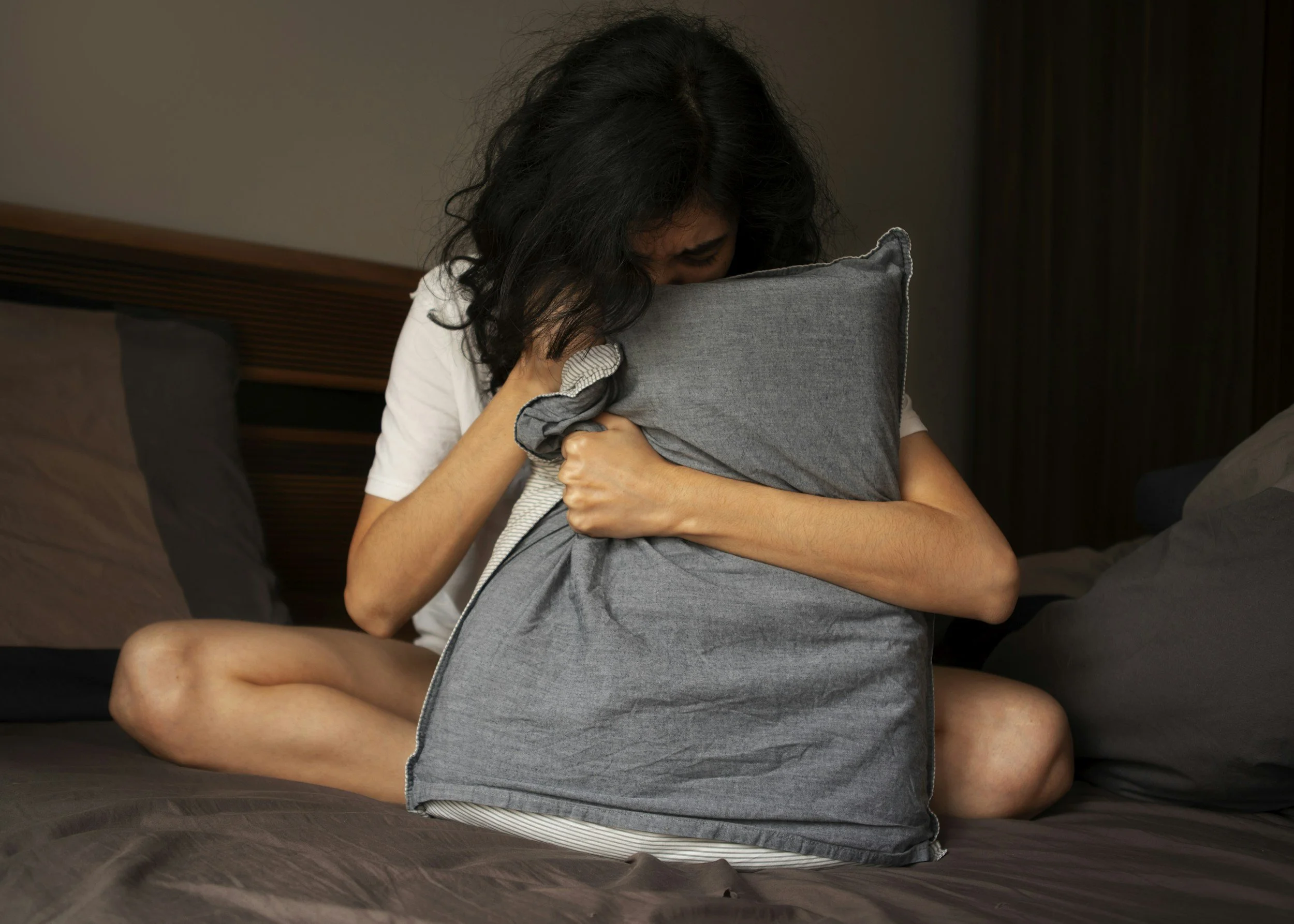Tired and Tense? The Connection Between Sleep and Anxiety (and Why It Matters More Than You Think)
We all know we’re supposed to “get more sleep.” It’s on every wellness list, every doctor’s checklist, and every mom’s mental to-do list.
But when your nervous system is revved up and your brain won’t stop spinning, sleep doesn’t feel simple. It feels impossible.
And here’s the kicker: when you don’t get enough sleep, your anxiety gets worse.
When your anxiety gets worse, sleep becomes even harder.
And so the cycle continues.
If you’ve ever found yourself stuck in this loop, you’re not alone. And no, you’re not lazy, broken, or undisciplined. You’re running on a nervous system that’s overworked and under-rested.
Let’s break this down.
Why Anxiety and Sleep Are So Tightly Linked
Your brain and body rely on rest to reset. Think of sleep like your nervous system’s reset button. It helps you process emotional stress, store memories, restore hormones, and calm inflammation.
So when sleep is interrupted or cut short (hi, motherhood), your system doesn’t get to recover. And that shows up as:
Shorter fuse
Racing thoughts
Feeling like everything is too much
Difficulty concentrating
More sensitivity to stress or chaos
Sleep deprivation doesn’t just make you tired. It puts your brain in survival mode.
And when your brain is in survival mode? It’s more anxious, more reactive, and less equipped to cope.
How Anxiety Messes With Sleep
It works both ways. Anxiety also makes sleep feel harder to reach.
When your nervous system is activated, it doesn’t know the difference between a tiger chasing you or just worrying about tomorrow’s schedule. It keeps you alert, tense, and vigilant—even when you’re safe in bed.
You might notice:
Trouble falling asleep
Waking up in the middle of the night and spiraling
Restless, light sleep that doesn’t feel restorative
Dreading bedtime because you know you won’t sleep well
And because your body isn’t fully resting, the next day feels heavier. Your tolerance for stress is lower. And your anxiety keeps building.
Sound familiar?
Why Moms Feel This So Deeply
Let’s name it: motherhood is the perfect storm for anxiety and sleep disruption.
There’s the hormonal changes, the sleep deprivation, the overstimulation, the constant caregiving, the pressure to be everything to everyone. Your system rarely gets a break. Even when your body slows down, your brain keeps going.
And in those few quiet moments—when the house is dark and your head hits the pillow—your nervous system finally has space to process everything it’s been holding in.
That’s why so many moms feel like anxiety waits for them at bedtime.
It’s not in your head. It’s in your body.
What Helps Break the Cycle
Getting better sleep doesn’t mean forcing yourself to sleep harder. It means supporting your nervous system so it can feel safe enough to let go.
Here are a few things that can help:
1. Create a wind-down window
Give yourself at least 30 minutes to transition out of the chaos of the day. Dim the lights. Put your phone away. Let your body know it’s time to slow down.
2. Stop trying to “perfect” your sleep
The more pressure you put on yourself to fall asleep, the more anxious your brain becomes. Shift your focus from “I have to sleep” to “I’m giving myself time to rest.” That reframe matters.
3. Use your senses to regulate
Try a warm shower, a weighted blanket, a calming scent, or soft music. These sensory cues help your nervous system transition out of high-alert mode.
4. Keep a brain dump journal nearby
If your thoughts start racing as soon as your head hits the pillow, write them down. Get them out of your brain and onto paper.
5. Don’t stay in bed tossing and turning
If you can’t sleep, get up and do something quiet and non-stimulating—like reading a paper book or doing gentle stretches. Return to bed when you feel sleepy again.
Therapy and Sleep: What’s the Connection?
You can buy all the sleep supplements and blackout curtains in the world, but if your nervous system doesn’t feel safe, sleep will still be a struggle.
That’s where therapy can be a game changer.
Together, we can:
Unpack what’s really keeping your nervous system stuck in high alert
Work through trauma or patterns that hijack your sense of safety
Practice nervous system regulation tools that support rest
Explore your thoughts around productivity, guilt, and rest
Because often, it’s not just about sleep. It’s about giving yourself permission to rest without shame.
Final Thoughts: You’re Not Lazy—You’re Exhausted
If you’re snapping more than usual, crying more than usual, zoning out more than usual—don’t rush to fix yourself. Check your sleep.
So many moms I work with beat themselves up for not being more patient, more productive, more resilient. But once we start addressing the sleep piece, everything shifts.
You start to feel more like you again.
And you deserve that.
Want to Work Together?
If your anxiety is keeping you up at night—or your lack of sleep is making everything feel harder—I’d love to help.
Therapy can support you in breaking the anxiety-sleep cycle and building a rhythm that actually works for your life.
I offer free 15-minute consults so we can talk about what you’re navigating and how I can help.
Click here to schedule your free consult.
You don’t have to do this alone. Let’s get you the rest you need to show up as the version of yourself you actually recognize.




